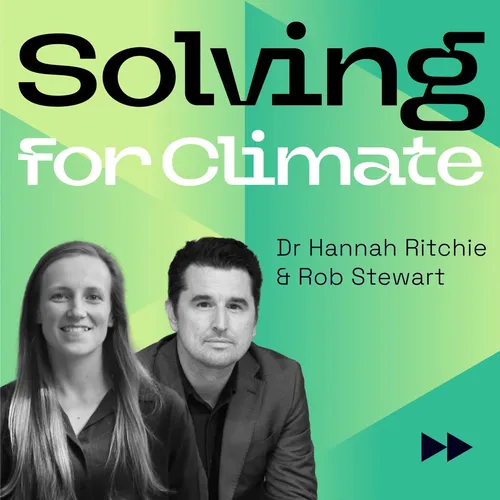
Solving for Climate
Hosted on Acast. See acast.com/privacy for more information.
- Update frequency
- every 6 days
- Average duration
- 30 minutes
- Episodes
- 18
- Years Active
- 2024 - 2025

Prof Alex Edmans: Does divestment from fossil fuels work?
Finance expert Professor Alex Edmans is sceptical that divesting from fossil fuels will make an impact and reduce carbon emissions. With his experience on the World Economic Forum’s Global Future Cou…

Dr Marit Brommer: Why don’t we use more geothermal energy?
Head of the International Geothermal Association, Dr Marit Brommer, says the world is sleeping on the power of geothermal. Currently, we use it’s energy for less than 0.5% of the world’s electricity.…

Heikki Malinen: Does sustainable aviation fuel work?
Neste has been developing an alternative to kerosene for powering planes over the past decade. CEO Heikki Malinen explains how SAF can be used alongside other advancements in aviation technology to r…

Guillaume Lambotte: Inside the race to decarbonise steel
Boston Metal are working on an alternative to a millennia old production process. The steel industry is responsible for around 7% of the world’s carbon emissions; decarbonisation is crucial.
As Chief…

Mark Titley: How do we stop deforestation?
As a senior researcher at Trase, Mark uses data like satellite imagery and shipping routes to help companies and governments track supply chains. Trase identifies links to deforestation, but do compa…

Emma Pinchbeck: Will net zero damage the economy?
The Chief Executive of the UK’s Climate Change Committee explains how our lives will change by 2050 if we continue to cut carbon emissions. She explains how her electric car is like her 'third child'…

Kathleen Alexander: Can you make edible oils without land?
We use an enormous amount of land for animal agriculture and crops like palm oil. But there’s a new fat on the market which is offering an alternative to dairy and vegetable oils. CEO of Savor, Kathl…

Cat Clifford: Why is nuclear energy back in fashion?
Small modular reactors. Nuclear fusion. Artificial intelligence. Senior economics correspondent for Cipher News, Cat Clifford, unpacks the latest innovations in nuclear energy and explains how China …

Zeke Hausfather: Why do we need carbon removal technology?
How much attention should we give to carbon removal technology versus stopping carbon emissions in the first place? Climate scientist Zeke Hausfather discusses the opportunities for carbon removal te…

Duncan Walker: Will electric air taxis take off?
Skyports are building the infrastructure for electric flying taxis that could change the way we travel. You might be able to ride in one in Dubai as early as next year. The CEO of Skyports joins Hann…

Lauren Eatwell: How do you make shipping sustainable?
The maritime industry is responsible for roughly 3% of global emissions. So one solution to help reduce fuel consumption has already set sail. Head of Engineering at BAR Technologies, Lauren Eatwell …

Solving for Climate will return
What are carbon credits? Can you eat fossil fuels? Why is nuclear energy back in fashion? Co-hosts Dr Hannah Ritchie and Rob Stewart will answer these questions and more in a new season of Solving fo…

Dr Luke Haverhals: Making plastics out of plants
‘Plastic has long been the fossil fuel industry’s ‘plan B’’ says Luke Haverhals, co-founder of NFW, a start-up dedicated to creating materials with plants, not oil. Plastic has a stranglehold over ou…

Mark Bjornsgaard: The free heat revolution
Data centres are not the most glamorous topic of discussion but they are everywhere, powering our modern, digital economy. But they can also power swimming pools, breweries and laundries, as Mark Bjo…

Dr Sasha Luccioni: The climate cost of AI
Despite the inexorable growth of Generative AI tools such as ChatGPT or Midjourney in the past couple of years, painfully little is known - or at least publicised - about their carbon impact. However…

Professor Sir David King: What’s whale poo got to do with it all?
How do we buy ourselves some time to save our planet? Humans are responsible for the immense damage inflicted on our planet since the Industrial Revolution, but now we have the chance to do some good…

Kingsmill Bond: How is the energy transition going?
‘It’s obvious that oil is on the decline’, says energy strategist Kingsmill Bond. He joins Hannah and Rob to talk about the energy transition and he’s got an optimistic take: he says that we reached …

Solving for Climate...coming soon
Hannah Ritchie and Rob Stewart are fascinated by solutions to the climate crisis and the innovators, entrepreneurs and scientists behind them. They want to shine the spotlight on the people working t…